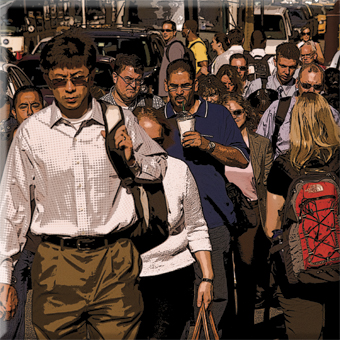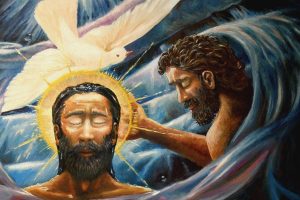When U.S. Catholic readers punch the clock, they don't forget that they are still on God's time, according to a Reader Survey in honor of Labor Day.
The more we strive to secure a common good corresponding to the real needs of our neighbors, the more effectively we love them," Pope Benedict XVI wrote in his recent encyclical Caritas in Veritate (Charity in Truth). "Every Christian is called to practice this charity in a manner corresponding to his vocation."
The pope's much-anticipated social encyclical was hailed as an astute critique of the modern globalized market in the face of today's economic crisis. Benedict wrote of labor rights, the value of human life along with the ecological health of our planet, international regulatory bodies, and other complex topics in a dense 30,000 words. The pope, though, was speaking not only to the world's leaders but to ordinary people.
"The fundamental message of this encyclical in reference to the everyday life of all Catholics and all people is that our economic activity is not something separate," Vincent Miller, an associate professor of theology at Georgetown University, says. "It's not a realm that follows its own rules. It is deeply moral. It's the place that we are called to exercise the love of God in the world."
Pope Benedict is preaching to the choir when it comes to U.S. Catholic readers, according to a Reader Survey on work and faith. More than 50 percent of readers and website visitors responding to the survey work for the church, for a religious or nonprofit organization, as volunteers, or in public service. The vast majority of respondents feel that their work is a calling from God (81 percent) or somehow makes a positive contribution to society (95 percent).
Through work, U.S. Catholic readers serve God and each other rather than their bank accounts. "Social justice can't be attained through a system where some people get rich and maybe give some back for the less fortunate. It doesn't result through greed that somehow translates into good," says Jim Lein of Minot, North Dakota, echoing the pope's encyclical before it was released. "Social justice requires direct effort."
Doing God's work doesn't mean that a job is perfect though. God's worker bees still have to deal with paperwork and office politics. Many readers say they currently have their dream job, though a number of readers add a caveat. One reader raises a common complaint in saying her dream job is "doing what I'm doing now but making a living wage."
The Missoula, Montana woman has a master's degree in pastoral theology, works for the church full time 10 months a year, and earns $20,000. She worries that she'll have to leave her job due to finances, but sharing the Good News with others is "what I was created to do," she writes.
"I feel called to stay in this position because nothing in this society matters as much as faith. I'm helping people awaken more fully to the living Christ-and they do the same for me." At the same time, she writes, "I don't feel appreciated for the education and leadership qualities I have as a woman in this church."
Church workers, 27 percent of the respondents, find both joy and frustration in responding to God's call.
"Sometimes the church preaches one ideal and, in its dealings with its employees and volunteers, doesn't live it," notes Charlee Wolf of Altoona, Pennsylvania. Pope Benedict and past popes have insisted on workers' right to unionize, for instance, but in the United States both Catholic schools and hospitals have fought unions.
Only 64 percent of readers responding to the survey say their workplace treats its employees and customers in an ethical and socially responsible manner. While her own workplace strives to do so, a San Francisco health care professional gives the church some slack. "Any institution, including the church, by virtue of the fact that it is run by fallible human beings, is not perfect," she writes.
Many respondents working for the church are teachers, a job that is particularly satisfying for those looking to do God's will. Carol R. of Castro Valley, California writes that she loves to "see the light come into a child's eye when he or she makes a connection."
Teaching within a Catholic institution can be challenging-and not just because of the low pay. It's discouraging when people don't "walk the talk," says Carol Koppenheffer of Anaheim, California. "I have to trust that, even when I don't see immediate results, I am still called to plant seeds. Hopefully my students will remember who I was and how I acted, even if they never remember a word I said."
A San Diego reader who teaches at a Catholic university says the connection between her faith and job is complicated by Pope John Paul II's document on Catholic universities, Ex Corde Ecclesiae: "I do not always advocate for magisterial teaching, but I do present official teachings alongside other positions and invite students to contrast the arguments." She says she's doing God's work by helping student "think critically about their faith commitments," and she loves "seeing students when they have that ‘aha!' moment."
Teaching in public schools, though, also has its difficulties. Claranell Zimmerman of Oklahoma City-among the 17 percent that sometimes feels their work is contrary to or in conflict with their faith-says she's doing God's work as a first grade teacher in an urban, public school. Still, "I often feel that the church does not value my work as an educator in the public sector as much as it does the work of educators in Catholic schools."
Whether in public or Catholic schools, teachers agree that their work goes beyond reading, writing, and arithmetic. A public school teacher from Lakeland, Florida says she models Christian behavior to young people. "It saddens me that I cannot speak of my faith," she writes. "I must witness to my faith each and every day outside of the church and behave in a manner that reflects my Catholic values."
No matter the setting, faith and work cannot be separated, the respondents agree. While few readers live entirely for their work, fewer still see it just as a paycheck. Nearly half of readers say their job is very important to their overall satisfaction with life.
Among those who live for their work is a handful of stay-at-home moms. This is a particular challenge: "It's much more difficult than the professional job I held before staying home but incredibly more rewarding," a Dublin, Ohio mom says. She and other women, though, worry about raising a family on one income in the midst of economic uncertainty.
Finances are critical, but few list income as the most important thing they get from a job. Jim Metrisin of Cleveland has given up a lot, including money, to be a photographer, he says, but "being self-employed allows me to use my free time to do volunteer work." He takes family portraits for those in hospice and visits the county jail.
Volunteering still doesn't pay the bills, notes Carol Jankunas of Fort Collins, Colorado. "It's terribly disheartening to be out of work in these times: Your family budget is in shambles, and you're living from one small crisis to another," she says.
The strong connection between faith and work means that faith can also suffer when out of work. "Your self-esteem suffers greatly and you have doubts about your own self-worth and your purpose, no matter your age," Jankunas says. "It makes me feel like I'm not contributing, that my skills and experience are wasted."
In the face of The economic crisis and the everyday challenge of balancing faith and work, many Catholics want more resources from the church. Church teachings in this area are "hidden," says Gregory Pierce of Chicago. Pierce publishes books on the spirituality of work through ACTA Publications but says his dream job is to be the pope.
"It is all there in the encyclicals and the documents of Vatican II, not to mention scripture," he says. "The problem is that most homilists and religious educators have forgotten or never learned, or don't believe the church's social teachings on work."
Though a number of readers agree, many seem to have learned from their own experience what the pope preaches about the necessity to live "charity in truth" in their daily lives.
"The call to holiness is, pardon the pun, holistic," writes lay ecclesial minister Katherine Coolidge of San Pedro, California. "I cannot leave my personal relationship with Christ in the hall closet as I go to work. Christ is present in the workplace, the grocery store, the family, the stranger in our midst. Faith has to be part of it all."
And the survey says. . .
I think of my work as a vocation or calling from God:
Agree – 81%
Disagree – 7%
Other – 12%
I feel that my work makes a positive contribution to society:
Agree – 95%
Disagree – 1%
Other – 4%
Work affects my overall satisfaction with life:
Entirely. I live for my work – 7%
A lot. It's important that I enjoy my job – 48%
Equally to factors outside work – 24%
Somewhat. My job matters to me, but life outside of work is more important – 12%
Not at all. It's just a paycheck – 2%
Other – 7%
I wish I could better connect my faith and my work:
Agree – 42%
Disagree – 45%
Other – 13%
Sometimes I feel like my work is contrary to or in conflict with my faith:
Agree – 17%
Disagree – 78%
Other – 5%
I am employed by:
The Church – 27%
I am retired – 19%
A religious or nonprofit organization – 15%
A for-profit business – 12%
I work as a volunteer – 7%
I am self-employed – 5%
I am unemployed – 5%
I am a stay-at-home parent – 3%
Other – 20%
The Church help me understand the spiritual role of work in my life:
Agree – 66%
Disagree – 20%
Other – 14%
In my experience, my workplace treats its employees and customers in an ethical and socially responsible manner:
Agree – 64%
Disagree – 19%
Other – 17%
Representative of "other": "I feel we can always work on relationships and justice even in the church."
My employment is directly threatened by the current economic instability:
Agree – 39%
Disagree – 50%
Other – 11%
I feel that I am doing God's work because . . .
It's how I do my work as a nurse. I see my patients as beloved children of God, which helps me not get burned out.
Susan Walsh
Butte, Mont.
Although I am unemployed, I teach religious education and I'm a lector and eucharistic minister. I try to live my life according to the gospel teaching: "Love one another as I have loved you." I'm working for God in everything I do and don't do.
Name withheld
Highland, Calif.
Being a stay-at-home parent isn't for everyone, but I truly believe this kind of hands-on parental involvement makes the most long-lasting positive impression on our children and their friends.
Stacie Lynne Adams
Perry, Kan.
I am an elementary educator and I feel that I am laying sound groundwork for our future church.
Sister Cristina Caballero, R.S.M.
Bakersfield, Calif.
I visit those in prison as Jesus called us to do.
Deacon Randy McMahon
San Clemente, Calif.
As I go out to my day, I think God placed me here to reach people because he couldn't be at this meeting. He sends me.
Sue Moylan
Elgin, Ill.
As an owner/manager I create a space in our workplace for God to operate. I put systems in place that help each employee be the best person they can be, have meaningful work, and grow and prosper both financially and emotionally.
Name withheld
Saginaw, Mich.
I can only hope that I am correctly discerning God's task in life for me.
Name withheld
Lansing, Ill.
If I could do anything, my dream job would be . . .
Working in an educational environment, preferably a high school, as an administrative assistant. I have worked in the business world for more than 30 years and do not care for it.
Diane Zinkula
Cedar Rapids, Iowa
Very close to what I have now, except it would be more intellectually stimulating, and promotions would be decided fairly and not by politics.
Name withheld
St. Louis, Mo.
To be a philanthropist, but I guess I have to have money to do that. Considering my limitations, I am doing what I have always wanted to do.
John Klieforth
Golden, Colo.
Helicopter ski guide, but I'd have to learn to ski a hell of a lot better than I do now.
Father Jack de Verteuil
Healy, Alaska
Priest, but I can't because I'm married.
John A. Radoani
Hamburg, N.Y.
Female deacon.
Name withheld
Cape Coral, Fla.
Professional baseball player.
Joe Scaffidi
Canton, Ohio
The most important thing I get out of my work is . . .
This sounds awful, but a check, insurance, retirement, and knowing that I'm contributing to the family income.
Name withheld
Casper, Wy.
Satisfaction and richness beyond measure that has nothing to do with money.
John A. H. Tomoso
Kahului, Hawaii
Knowing that I make a difference as a teacher, whether it is for the student who was having a bad day, the one who got in trouble and learned a lesson, or the one who turned out to be a great scientist (sometimes all three in the same student).
Ryan Moser
Eugene, Ore.
A sense of cooperating in God's love for each person.
G. Jean Bierly
Blue Earth, Minn.
The satisfaction of personal achievement, plus having the resources to be able to raise good children who will do their part for society.
Rob Weber
Zumbrota, Minn.
That I have helped someone recover health, and on rare occasions, even saved a life.
Dr. Robert Irwin
Berkeley, Calif.
Joy and satisfaction in experiencing people coming into deeper relationship with God and accepting the day-to-day in the embrace of God's love.
Father George M. Schroeder
Scottsdale, Ariz.
When I complain about my job, it's because . . .
I'm shuffling paperwork and not seeing people.
Shannon O'Donnell
Shelton, Wash.
I know I can do and give more. My skills are lying dormant for no good reason except lack of opportunity.
Name withheld
Colorado Springs, Colo.
It's hard to have spent 40 years helping the less fortunate with the hope that America would develop into a society that takes care of its poor. Sometimes it seems so hopeless. What has changed?
Dr. Lawrence Ludwig
Fairfield, Calif.
As a layperson in church ministry, I feel as though the church looks at me as the temporary (and inadequate) back-up. I'm not as valuable as an ordained male. That attitude isn't very conducive to developing a sense of spirituality about the work.
Name withheld
Cincinnati, Ohio
Parenting never ends, and I never get a break. I get really tired.
Katie Jones
Great Falls, Mont.
Sometimes I believe that some in the hierarchy do not have a clue about the reality of parish life.
Father Daniel L. Warden
Houston, Texas
I'm tired and sometimes I'm frustrated with trying to make everyone happy.
Glenna Benton
Concord, Calif.
What the church teaches me about the connection between my work and faith is . . .
They are inseparable. If faith doesn't permeate every aspect of my life, it isn't real.
Kevin Schultz
Spokane Valley, Wash.
I must be a missionary. People need to know a living God active in their lives. Together we make up the Body of Christ.
Helen Stejskal
Maquoketa, Iowa
To look to God for a job that helps me balance work and family.
Tamara Strobel
Great Bend, Kan.
The Benedictines' motto Ora et labora (pray and work) reminds me that work can be prayer. Work can be holy when I bring a sense of reverence and awareness of God's presence to it.
Carol Gregg
Crookston, Minn.
Our talents are given to us by God and are to be used for his sake.
Deacon Vern Schmitz
St. Cloud, Minn.
When you help the least of these, you help me.
Philip J. Butzen
San Diego, Calif.
General Comments
Our current economic situation makes it obvious that profit takes precedence over keeping people employed and developing their skills and careers. I would gladly work for a lower wage at a company whose top management had hearts instead of dollar signs as their main priority.
Bob Ulicki
Cupertino, Calif.
It would be helpful to hear a validation of moms who work because it fulfills their sense of themselves. Some moms aren't meant to be stay-at-home moms, and they need to know that is OK.
Jeanie Lewis
Chicago, Ill.
We have been taught in this work culture that we are supposed to be "in charge," but I've learned that we need to do what we can, and then leave the worrying to God.
Gerry Czerak
Naperville, Ill.













Add comment